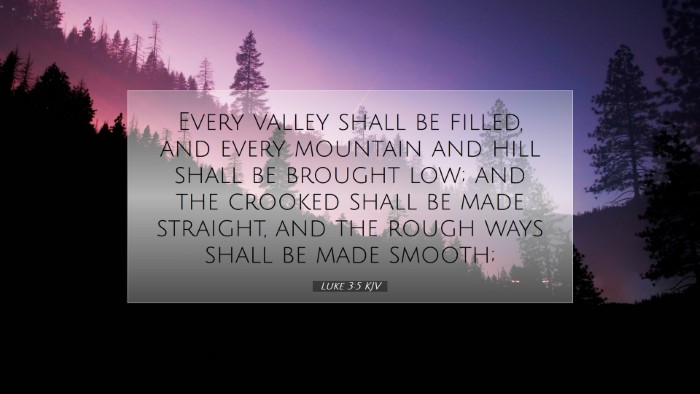Commentary on Luke 3:5
Luke 3:5 states: "Every valley shall be filled, and every mountain and hill shall be brought low; the crooked shall become straight, and the rough places shall become level ways." This verse is a profound proclamation of the transformative work of God, embodied in the ministry of John the Baptist and ultimately fulfilled in Jesus Christ.
Contextual Overview
The backdrop of this passage is set within the prophetic declarations heralding the coming of Christ. John the Baptist is depicted as the forerunner, tasked with preparing the way for the Lord. This concept of preparing the way involves not just physical alignment but also spiritual readiness.
Insights from Matthew Henry
Matthew Henry emphasizes the metaphorical significance of the geographical imagery used in this verse. He asserts:
- Valleys Filled: The 'valleys' symbolize the humble and lowly, suggesting that those who are downtrodden or in despair will find elevation and hope.
- Mountains Laid Low: The mountains represent pride and self-exaltation, illustrating that God will humble the proud and those who oppose Him.
- Straight Paths: The 'crooked' ways are indicative of sinful paths, and by making them straight, God is calling for repentance and righteousness to prevail.
- Rough Places Made Level: The rough terrains metaphorically signify obstacles and hardships in life, which will be smoothed out through divine intervention.
Reflections from Albert Barnes
Albert Barnes further elucidates the eschatological themes present in this verse:
- Preparation for the Lord: Barnes explains that this prophetic declaration serves as God’s promise of reformation and redemption, aimed at restoring His creation.
- Symbol of Repentance: He posits that the act of leveling paths symbolizes the necessity for repentance and a changed heart, underscoring the internal transformation required of believers.
- Inclusiveness of God’s Grace: Barnes highlights that this leveling is not restricted to a select group but extends God’s grace to all, making the way accessible to everyone willing to follow.
Interpretations by Adam Clarke
Adam Clarke offers a classic interpretation, focusing on behavioral and spiritual applications:
- Spiritual Elevation: Clarke interprets the filling of valleys as a restoration of spiritual elevation, encouraging believers to seek a relationship with God that transcends worldly trials.
- Confrontation of Pride: He concurs with Henry, noting the danger of pride, asserting that God’s kingdom requires humility and contrition, serving as a corrective measure against arrogance.
- Call to Holiness: Clarke emphasizes the call for believers to pursue holiness, which involves rectifying immoral and unethical behavior, thus aligning with Christ’s mission.
Overall Theological Implications
The theological implications of Luke 3:5 extend beyond preparation for Christ's first coming; it embodies the ongoing work of God in the hearts of His people.
- God's Sovereignty: This passage reveals God's sovereign ability to reshape both the physical and spiritual landscapes, demonstrating His control over all creation.
- Nature of Repentance: The imagery encourages a deep introspection into one's life, compelling believers to identify and address areas in need of God’s transformative power.
- Universal Call: The promise of filled valleys and leveled mountains serves as an invitation for all humanity to respond to God’s grace, suggesting the universality of the Gospel.
Pastoral Applications
Pastors and spiritual leaders may draw several practical applications from this verse:
- Encouragement to the Downtrodden: Leaders can use this verse to minister hope to those feeling low or marginalized within their communities.
- Sermons on Humility: This passage serves as a strong foundation for sermons on the necessity of humility before God's majesty.
- Calls to Action: Pastors can encourage their congregations to identify 'crooked' paths in their lives and to actively seek pathways to righteousness.
Conclusion
Luke 3:5 intricately weaves the themes of hope, repentance, and divine intervention as foundational tenets of the Christian faith. The promise that 'every valley shall be filled' and that obstacles shall be removed remains a pertinent reminder of God's unfailing commitment to His people. The combined insights from Matthew Henry, Albert Barnes, and Adam Clarke provide a comprehensive understanding that will enrich the theological study and application of this scripture for pastors, students, and scholars alike.


